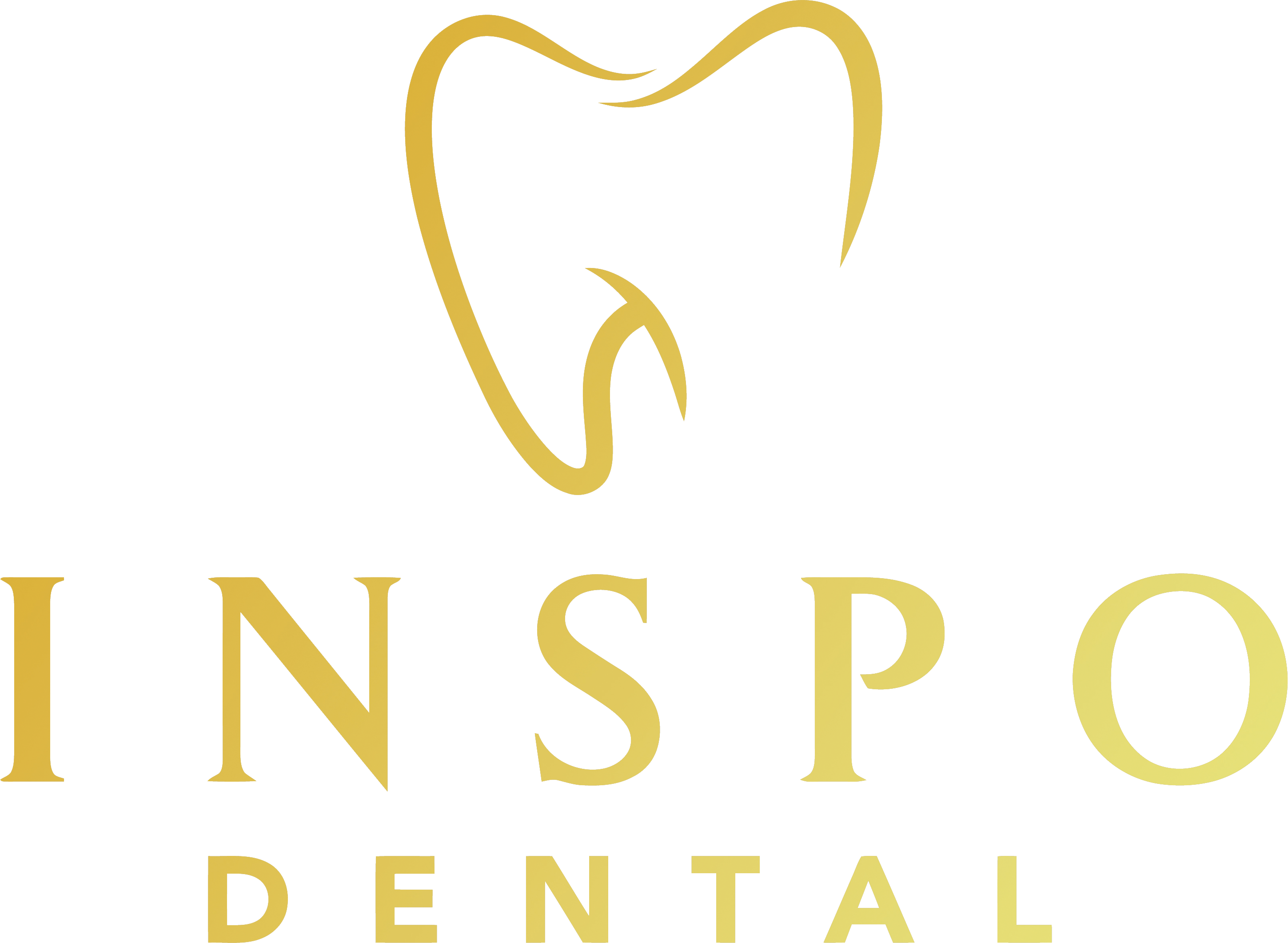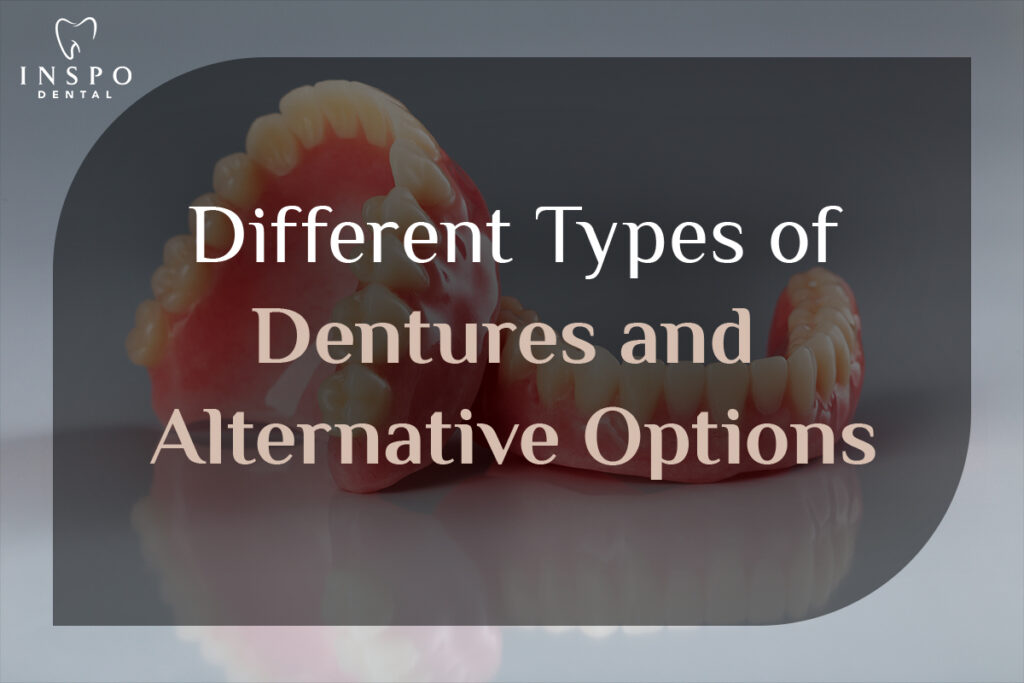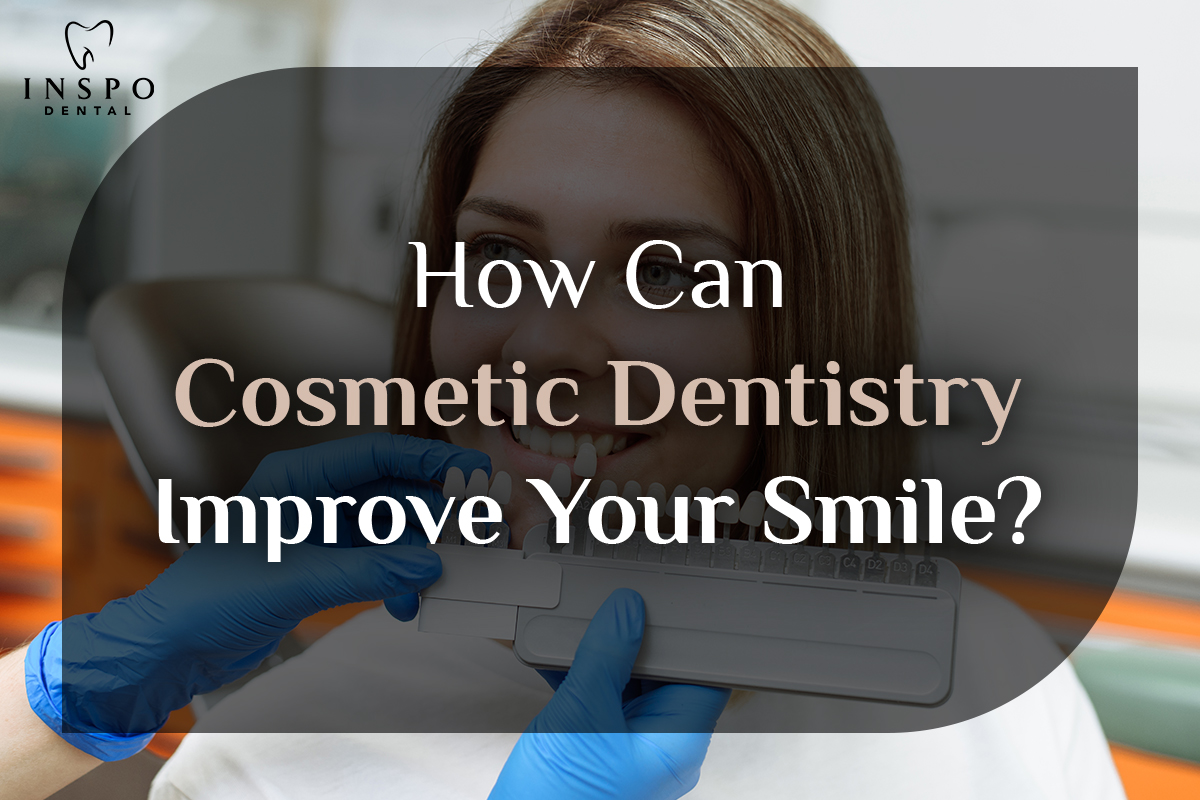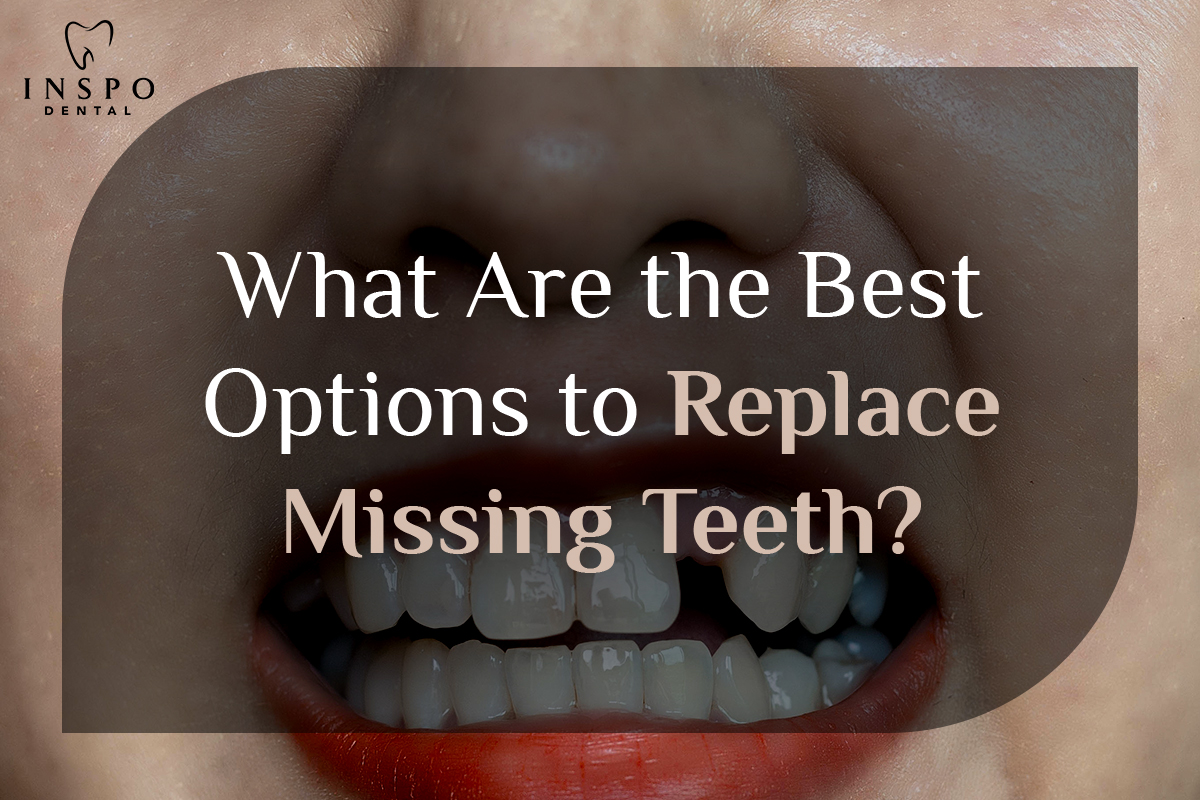
Dentures are a common solution for replacing missing teeth and restoring oral function and aesthetics. There are various types of dentures, each designed to address specific dental needs and preferences. Additionally, there are alternative options to dentures for those seeking different solutions. Here’s an overview of the different types of dentures and alternative options:
Types of Dentures
- Complete (Full) Dentures:
- Description: Replace all the teeth in either the upper or lower jaw, or both.
- Types:
- Conventional Full Dentures: Made after the remaining teeth are removed and the gums have healed.
- Immediate Full Dentures: Placed immediately after the removal of remaining teeth; adjustments are made as the gums heal.
- Partial Dentures:
- Description: Replace one or more missing teeth while some natural teeth remain.
- Types:
- Removable Partial Dentures: Typically consist of replacement teeth attached to a pink or gum-colored plastic base, connected by a metal framework that holds the denture in place.
- Fixed Partial Dentures (Bridges): Permanently attached to the adjacent natural teeth or dental implants.
- Implant-Supported Dentures:
- Description: Attached to dental implants for better stability and support.
- Types:
- Bar-Retained Dentures: A thin metal bar is attached to multiple implants, and the denture fits over the bar and is clipped into place.
- Ball-Retained (Stud-Attachment) Dentures: Each implant has a metal attachment that fits into a corresponding attachment on the denture.
- Overdentures:
- Description: Fit over a small number of remaining natural teeth or dental implants.
- Types:
- Tooth-Supported Overdentures: Use the natural teeth for support.
- Implant-Supported Overdentures: Use dental implants for support, providing better stability.
- Snap-In Dentures:
- Description: Securely snap onto dental implants or locator attachments.
- Benefits: Offer more stability than traditional dentures and can be easily removed for cleaning.
- Custom Dentures:
- Description: Tailored to fit a patient’s mouth more comfortably and look more natural.
- Benefits: More personalized fit and appearance.
- Economy Dentures:
- Description: Basic, low-cost dentures.
- Drawbacks: May not fit as comfortably or look as natural as custom options.
Alternative Options to Dentures
- Dental Implants:
- Description: Titanium posts surgically placed into the jawbone, acting as artificial tooth roots.
- Benefits: Provide a permanent, stable solution that feels and functions like natural teeth.
- Types:
- Single Tooth Implants: Replace individual missing teeth.
- Implant-Supported Bridges: Replace multiple missing teeth.
- All-on-4/All-on-6: Full-arch restoration using four or six implants to support a full set of teeth.
- Dental Bridges:
- Description: Fixed prosthetic devices that fill the gap created by one or more missing teeth.
- Types:
- Traditional Bridges: Involve creating a crown for the teeth on either side of the missing tooth/teeth with a pontic (false tooth) in between.
- Cantilever Bridges: Used when there are adjacent teeth on only one side of the missing tooth/teeth.
- Maryland Bonded Bridges: Use a metal or porcelain framework bonded to the back of adjacent teeth.
- Veneers:
- Description: Thin, custom-made shells of tooth-colored materials designed to cover the front surface of teeth.
- Benefits: Primarily used for cosmetic improvements rather than tooth replacement.
- Fixed Partial Dentures:
- Description: Also known as fixed bridges, these are cemented onto existing teeth or implants and can only be removed by a dentist.
- Benefits: Provide a more stable and natural-looking solution compared to removable partial dentures.
- Hybrid Dentures:
- Description: A combination of traditional dentures and dental implants, offering a permanent solution that is screwed onto implants.
- Benefits: Provide the stability of implants with the coverage of dentures, improving function and comfort.
- Dental Crowns:
- Description: Caps placed over damaged or decayed teeth to restore their shape, size, and function.
- Benefits: Protect and strengthen teeth, often used in conjunction with other dental treatments.
Considerations for Choosing the Right Option
- Oral Health:
- Assess the condition of remaining teeth and gums.
- Determine bone density and suitability for implants if considering implant-supported options.
- Budget:
- Evaluate the cost of different options, including potential long-term maintenance costs.
- Consider insurance coverage and financing options.
- Aesthetics:
- Prioritize solutions that offer the desired appearance and natural look.
- Comfort and Function:
- Choose options that provide the best comfort and functionality for daily activities like eating and speaking.
- Maintenance:
- Consider the ease of maintenance and hygiene requirements for each option.
- Longevity:
- Evaluate the expected lifespan of each solution and the need for future adjustments or replacements.
- Professional Advice:
- Consult with a dental professional to assess individual needs, preferences, and the best suitable options.
There are various types of dentures and alternative dental solutions available, each with its own set of benefits and considerations. Understanding the different options can help you make an informed decision that best suits your dental needs, lifestyle, and budget. Always consult with a dental professional to evaluate your specific situation and receive personalized recommendations.
In-Depth Analysis of Alternative Options to Dentures
Let’s dive deeper into the alternative options to dentures and explore their benefits, potential drawbacks, and ideal candidates in more detail.
Dental Implants
Pros:
- Durability: Implants are made of titanium and integrate with the jawbone, providing a long-lasting and durable solution.
- Aesthetic Appeal: Implants look and feel like natural teeth, enhancing the appearance of the smile.
- Functional Benefits: They restore full chewing power and do not slip or move, unlike dentures.
- Bone Preservation: Implants stimulate the jawbone, preventing bone loss and maintaining facial structure.
Cons:
- Initial Cost: The initial investment is higher compared to other tooth replacement options, though they may be more cost-effective in the long run due to their durability.
- Surgical Risks: Implant placement requires surgery, which carries risks such as infection, nerve damage, and implant failure.
- Time-Consuming: The process can take several months, involving multiple stages including consultation, surgery, healing, and crown placement.
Ideal Candidates:
- Individuals with sufficient jawbone density and good oral health.
- Those seeking a permanent, stable, and natural-looking tooth replacement solution.
Dental Bridges
Pros:
- Fixed Solution: Bridges are permanently fixed in place and do not require removal for cleaning.
- Aesthetic Integration: They are custom-made to match the surrounding natural teeth, providing a seamless appearance.
- Quick Procedure: The placement of dental bridges typically takes less time than implants, often completed within a few weeks.
Cons:
- Impact on Adjacent Teeth: The preparation process involves reshaping adjacent teeth, which can weaken them.
- Potential for Decay: The abutment teeth (supporting teeth) are more prone to decay and gum disease due to the difficulty in cleaning around the bridge.
- Longevity: Bridges typically last 5-15 years, after which they may need to be replaced or repaired.
Ideal Candidates:
- Individuals missing one or a few teeth with strong, healthy adjacent teeth.
- Those seeking a fixed, aesthetically pleasing option with a quicker treatment timeline than implants.
Veneers
Pros:
- Cosmetic Enhancement: Veneers effectively cover imperfections such as discoloration, chips, and minor misalignments, greatly improving the appearance of teeth.
- Minimally Invasive: The procedure involves removing a small amount of enamel, making it less invasive than crowns or implants.
- Durability: High-quality veneers can last 10-15 years with proper care.
Cons:
- Cost: Veneers can be expensive, especially when multiple teeth are treated.
- Irreversible Procedure: The process is irreversible because it involves removing part of the tooth enamel.
- Not Suitable for All: Veneers are not suitable for individuals with severe tooth decay, gum disease, or significant misalignment.
Ideal Candidates:
- Individuals with primarily cosmetic concerns looking to enhance the appearance of their smile.
- Those with minor dental imperfections who prefer a minimally invasive solution.
Fixed Partial Dentures (Bridges)
Pros:
- Stability: Fixed partial dentures (bridges) provide a stable solution that does not shift or move.
- Aesthetic and Functional Benefits: Bridges restore the natural appearance and function of teeth, allowing for normal chewing and speaking.
- Quicker Than Implants: The placement procedure is generally quicker than dental implants.
Cons:
- Dependence on Adjacent Teeth: The health and strength of adjacent teeth are critical, as they support the bridge.
- Maintenance: Proper oral hygiene is essential to prevent decay and gum disease around the bridge.
- Replacement Cycle: Bridges may need to be replaced every 10-15 years.
Ideal Candidates:
- Individuals with one or more missing teeth with healthy teeth on either side of the gap.
- Those preferring a non-removable option that provides a natural look and feel.
Hybrid Dentures
Pros:
- Combined Benefits: Hybrid dentures offer the stability of implants with the coverage of dentures.
- Bone Health: They help maintain bone density by stimulating the jawbone through the implants.
- Comfort: Provide a more comfortable fit compared to traditional dentures, with fewer issues related to slipping or movement.
Cons:
- Higher Cost: The cost is higher due to the need for multiple implants and custom denture fabrication.
- Surgical Procedure: Involves surgical placement of implants, which may not be suitable for everyone.
- Maintenance: Requires regular cleaning and maintenance to ensure longevity and comfort.
Ideal Candidates:
- Individuals seeking a stable, long-term denture solution with the benefits of implants.
- Those with sufficient bone density for implant placement and looking for improved comfort and function.
Factors to Consider When Choosing a Tooth Replacement Option
- Oral Health Status: Evaluate the health of remaining teeth, gums, and jawbone density. This assessment will determine the suitability of implants, bridges, or other solutions.
- Budget: Consider both the initial cost and long-term maintenance expenses. While implants may have a higher upfront cost, they can be more economical in the long run due to their durability.
- Aesthetic Preferences: Choose solutions that align with your aesthetic goals. Custom dentures, veneers, and implants can offer a more natural and appealing look.
- Comfort and Function: Assess the impact on daily activities such as eating and speaking. Implant-supported options and fixed solutions generally offer better comfort and function.
- Maintenance Requirements: Understand the maintenance and care required for each option. For example, removable dentures need regular cleaning, while implants require good oral hygiene practices.
- Treatment Timeline: Consider the time required for the entire treatment process. Implants take longer due to the healing phase, whereas bridges and dentures can be fitted more quickly.
- Longevity: Evaluate the expected lifespan of the solution. Implants and fixed bridges typically last longer than removable dentures.
- Professional Advice: Consult with a dental professional to receive personalized recommendations based on your specific dental needs, lifestyle, and preferences.
Selecting the right tooth replacement option is crucial for restoring oral health, functionality, and aesthetics. Understanding the various types of dentures and alternative options, along with their respective benefits and drawbacks, enables you to make an informed decision. Always consult with a dental professional to ensure the chosen solution aligns with your individual needs and provides the best possible outcome for your oral health and quality of life.
